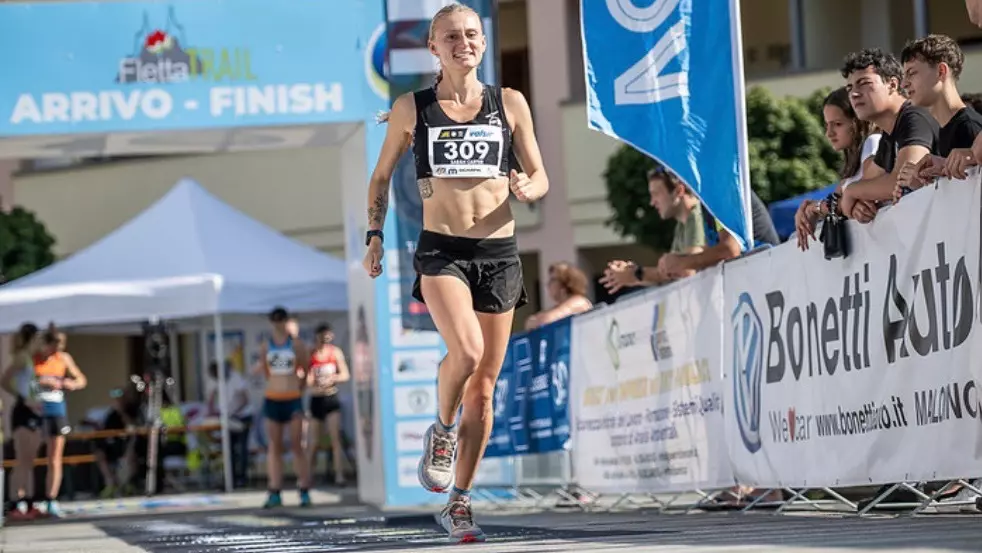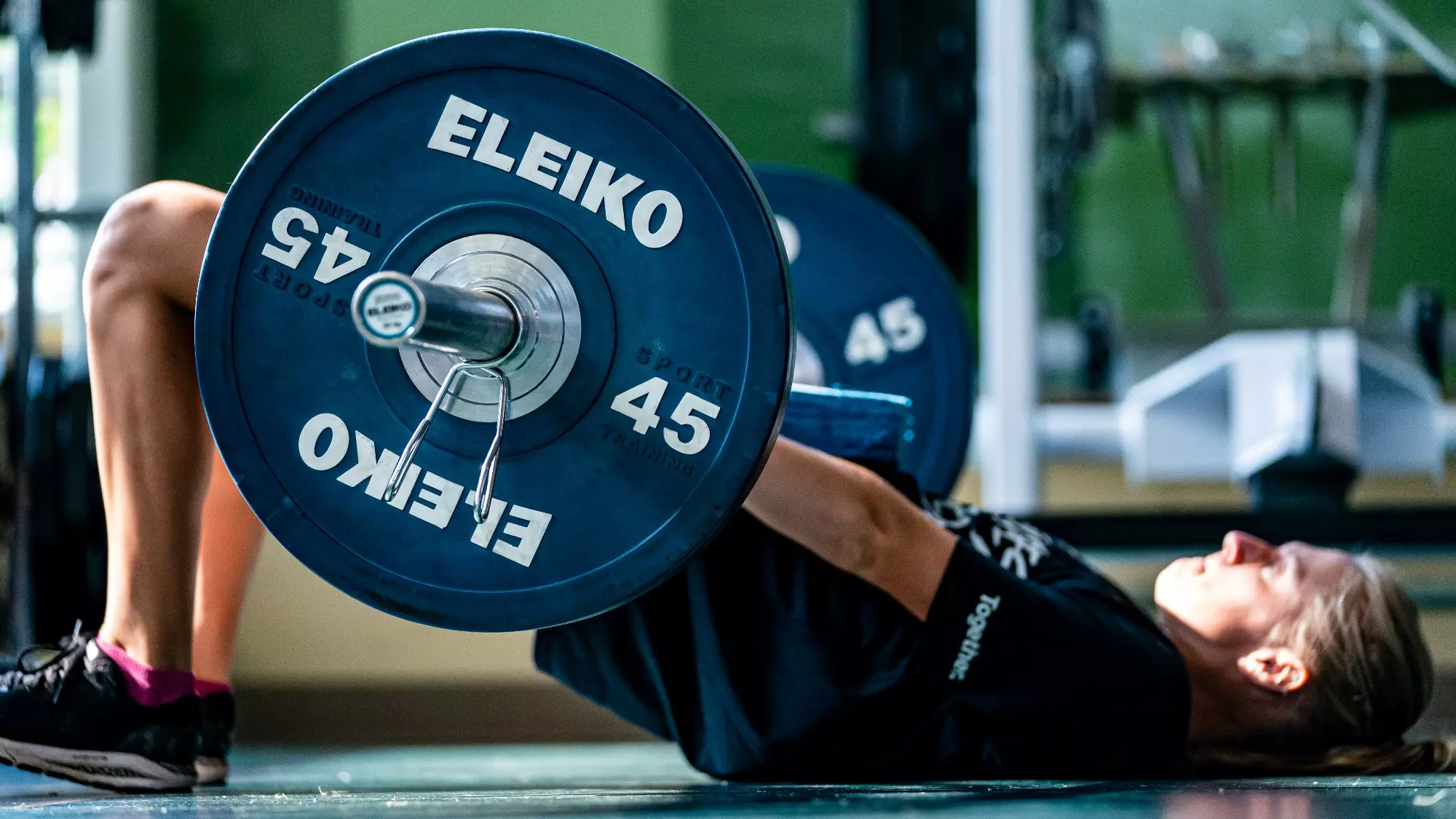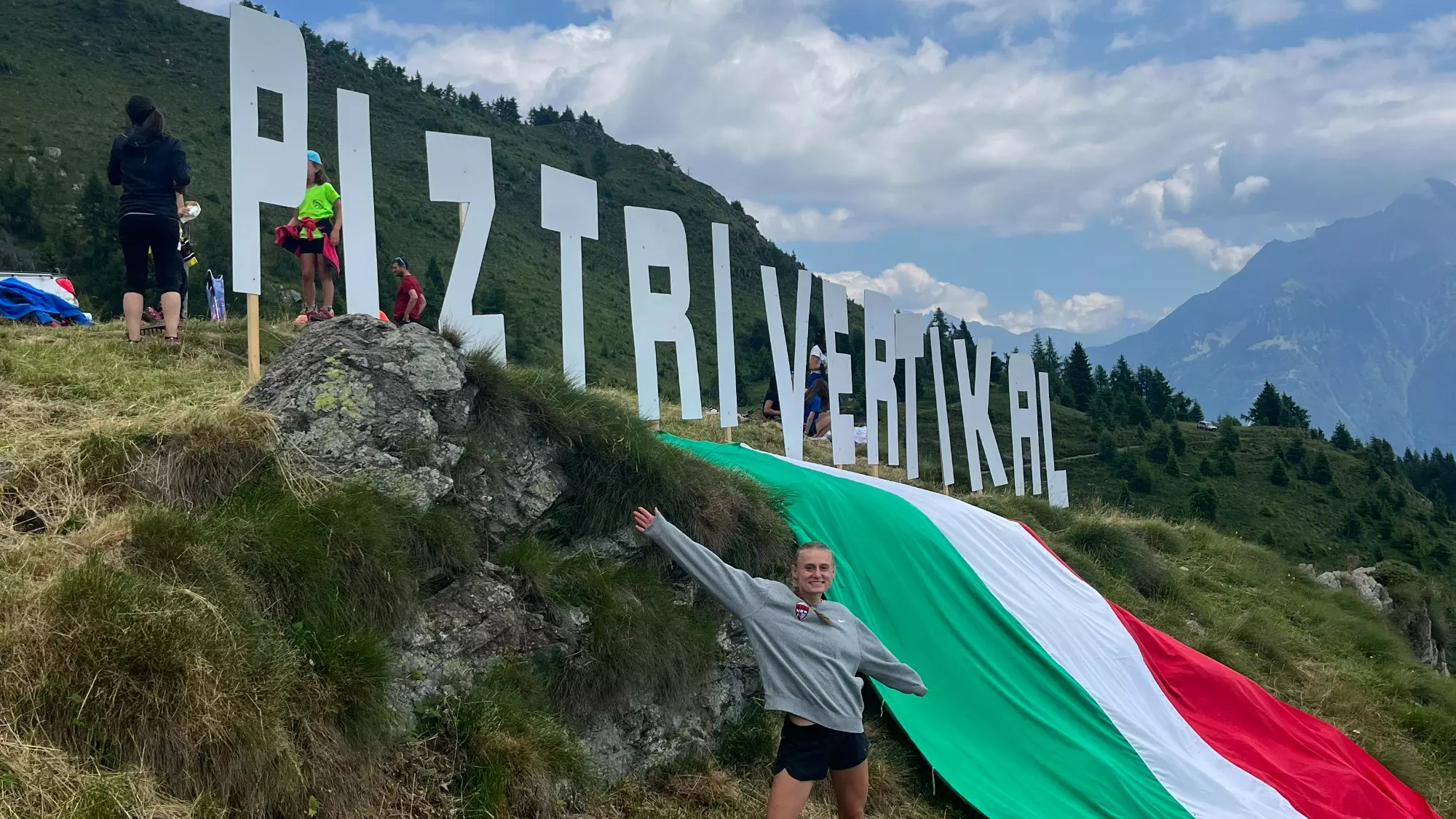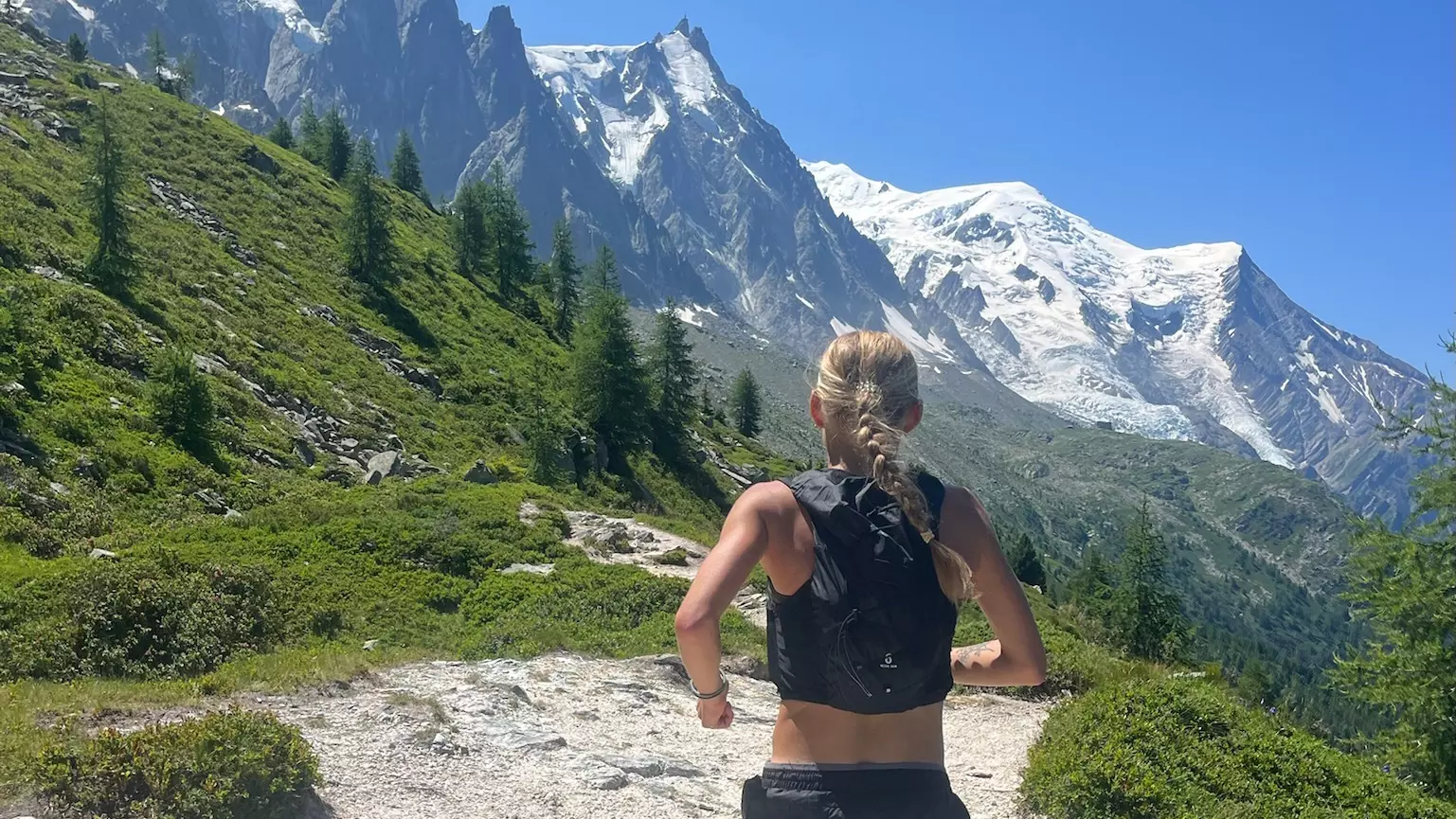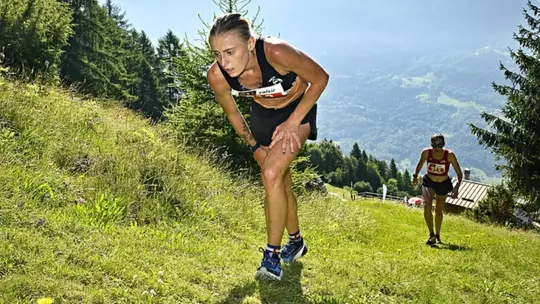
Elevating Her Performance in Her Own Personal Way
CSU super senior Sarah Carter chases new heights in the mountains
Mike Brohard
Intense. Not just an adjective when describing Sarah Carter. For her, there is a much deeper connection.
For Colorado State’s super senior on the cross country team, it’s a vibe. A lifestyle. A personality, not a trait.
“Honestly, I think is something I’ve always had. I’ve always been a very competitive person no matter what I was channeling into,” Carter said. “I’ve always needed some kind of competitive outlet, whether it be athletic or academic. As I honed in on running as a sport, the intensity there just kind of built up, especially as it was something over the years. When you put a lot of time and dedication into something long term, that outcome matters more. Also, as I have begun to see the reality of how far I can go with it, the intensity just comes with that, thinking I could reach these benchmarks or compete on a world stage. How could you not be intense about something like that?”
Her intensity is no longer absolute. As she’s progressed in her running career, which has seen her become a Mountain West champion and an All-American on the track for the Rams, she’s learned to dial things back when she needs to, ramp back up when it’s necessary. It is a tool. A means.
There has to be a healthy balance.
“I think she’s really intense, but she also finds a way to be really light, too. I think that’s what’s really valuable for our team,” first-year head coach Kelly Hart said. “They see someone who takes running, super, super seriously, but is also goofing around and picking up snakes on runs. I think it’s really an inspiration for other women on the team who want to accomplish what she’s done on the track and in cross country. They see someone who is really intentional. She comes to practice really purposeful and prepared, but also can find the fun in it too.”
To clarify, Carter’s approach to running is what is inspirational, not the picking up of snakes, as some of her teammates do not find the reptiles to be as fascinating as Carter does. This was not a one-off occurrence. If she sees a snake on a run, she’s very likely to snatch it up and take a look.
Her dad, David, likes snakes, too, so that was something they’d often do on runs. It is from him where her intensity started to build, as he never let her win at anything growing up. He told her when she finally beat him, it would mean something. The activity didn’t matter, the merit did.
Anything she accomplished, she was going to earn. Against him, the moment didn’t come until her junior year of high school and the event was a 5K. Beating dad was monumental. So, too, was the realization running in college was no longer a passing fancy but a realistic goal.
Her intensity always pushed her. Not always in a healthy way, and when she transferred to Colorado State, she said she came with “baggage,” which she’s learned to shed. The first big step was learning to listen to her body.
Now, a day off can actually be a day off. There’s no lingering thought she should be doing some activity, being cross training, lifting or even taking a bike ride. One day a week, Sarah leaves the running shoes behind. It’s good for her mentally to be a person and she sees the value in hanging out with friends and recharging the body and soul.
She’ll work. This summer, she had four clients she did landscaping for, another one where she cleaned their house. During the school year, she will be a graduate teaching assistant. Additionally, she fosters cats for the Animal Friends Alliance. She currently is looking after one, but there have been as many as three in her house at once.
She values getting away, and she sees the benefits in her running. And in the offseason, she created a rational approach to escaping the competitive routine and finding another way to train. Trail (or mountain) running has been her route.
“For other athletes, a couple thousand feet of elevation a week would be more appropriate, but Sarah’s a little different that way.”Kelly Hart
This summer, she took it to the extreme. In less than a month, she went from a trail race in Utah to three in Europe. The four runs in those events accumulated climbs of more than 16,000 feet in elevation, most with a steep grade. Carter felt it was a great idea.
She was very much alone in the assessment.
“No. She did three races in like a few days, something crazy like that, and they were like 5,000 feet of elevation gain,” teammate Emily Chaston said. “Just doing that in a long run with a few days to recover -- and I’d want half the elevation gain … I don’t know how she did it, but she loves it. She loves the hills and the mountains.
“It’s definitely nuts. It’s nuts to anybody. They were so steep, and that’s what so crazy. She’s putting her hands in front of her, it was that steep. You can’t even run that.”
Which was exactly the point for Carter, who called her summer schedule “abbreviated.”
OK.
It all started with a race in Snowbird, Utah shortly after the conclusion of the NCAA Championships, where she competed in the 5,000 and 10,000 meters. Her sixth run back, it covered nine miles with 3,600 feet of climb.
The race, Sarah said, was a warmup for Europe and her first races running in the elite classification – same as her running the Grand Canyon last holiday season was a precursor for the track season -- an opportunity which arose through the Trail Team based in Boulder.
In Italy, she did two races on back-to-back days. The first was 2.5 miles with 3,300 feet of climb with a steep grade. The final stretch is called the “death zone”, as the grade was 48 percent.
“That hurt,” Carter said bluntly.
So much so the next day she ran a 12.5 mile race with a climb of 3,700 feet in an international field complete with former world champions.
She had another race the following weekend, so in the days between she ran up some more mountains to prepare for the race in the French Alps, a journey which covered just less than 12 miles and mostly uphill. The total vertical climb was around 6,000 feet.
She placed in the top 20 in all of the races, her best finish being ninth in the final event in France.
Every season, a coach will give athletes a summer workout program. None of these races were on the sheet Hart gave Carter.
“Not me, or I probably wouldn’t recommend it for anybody else on our team, but Sarah, she’s built up that over time. She’s done a lot of trails over the summer, so for her now, after many summers of college training – I won’t say it’s an appropriate volume for her, but that’s an OK limit to push herself to,” Hart said. “For other athletes, a couple thousand feet of elevation a week would be more appropriate, but Sarah’s a little different that way.”
For Sarah, it was perfectly appropriate more so mentally, even though for her, there were physical gains. Trail running builds up her strength, and after numerous ailments early in her career, she’s found it helps her injury prevention.
The schedule seems nuts to most, but her logic makes perfect sense. She wasn’t getting away, she needed to get away.
“I think this summer has been a nice reset for me. Mountain running, you’re honestly doing a lot of hiking, a lot of 15-minute pace. You’re doing climbs that are longer than any single race I’ll do in cross country,” Sarah explained. “While the strength building is similar, the type of intensity is completely different. In a sense this was a very good cleanse from what we do in the NCAA, which is very pace-oriented, very fast. It’s a different kind of competitiveness, there’s a different feel to the racing. I think the best thing this could possibly do was distance me from some of the intensity of the NCAA that can wear on you at times and remind me what a good, honest grind feels like.
“There’s no break, there’s no letting up, but there’s also no splits. Most of the time there’s nobody watching you, no coach seeing you out there, so you have to keep yourself honest, and I think that’s what comes into play for cross country. It’s a short race. It’s fast. It feels nothing like mountain racing, but there does come a point in that race where you have to keep yourself honest. I can ease it back, I know there’ an uphill so I can relax. I can use this downhill to recover. No, I need to keep pushing this.”
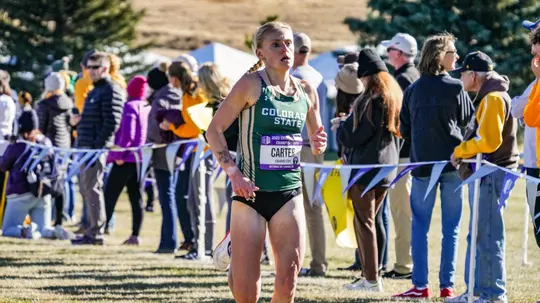
“If there is anything I got out of the trail racing that will come back to cross country, there are moments where you don’t want to push harder but you have to.”Sarah Carter
In 2022, Colorado State’s women’s team reached the NCAA Championships for the third consecutive season, and for the first time since 2004 years, both the men and women qualified. Sarah led the women’s charge to a 25th-place showing, running the 6K at the Oklahoma State Cross Country course in 20:15. She was 43rd overall, just three spots away from being an All-American.
Those three spots amounted to a 1-second lag. That blip in time can be found in the instant where a runner says no, not go.
That was not the intent of her summer climb to elevate her running, but it could be a tremendous bonus result. And the intensity it requires plays well for the team, whom Sarah says handles her with tremendous “grace and patience.”
“Yeah, she’s intense when she needs to be intense. She’s intense on race day; she takes it really seriously, every time,” said Chaston, one of three returners from CSU’s national roster. “She has a strict pre-race ritual. She’s intense on workout days, but not too much. She can focus when she needs to, but she also has that good balance of we need to make it lighthearted and fun, even when it gets tough because sometimes that’s all that will get you a workout.
“On easy days, she’s just fun. She takes it slow, she listens to her body, but she also works her butt off. She runs more mileage than any other girl on the team, and she’s in the weight room more than any other girl on the team. She’s very focused, but she also has that really good balance.”
Carter embraces the fact she’s the oldest person on the team, and in fact, she feels it jibes perfectly with what she calls her grandma habits. Chaston said Carter not only bakes, but bakes often. And always for others without accepting payback or a gesture in kind. She also knitted green scrunchies for the team to wear at races.
Sarah wasn’t thinking about an extra year until she was told she still had eligibility, then there wasn’t really any thought process about coming back. The bonus is she’ll eventually leave Colorado State with more degrees than a summer in Phoenix.
She’s earned her undergrad in Ecosystems Sciences and Sustainability and her master’s in Forest Sciences, and this year she’ll work toward a grad certificate in wildlife conservation actions. She was all in because she’s thoroughly invested in continuing the program’s success with the young women she’s bonded with these past few seasons.
“I think our team is looking like we’re in a good position to make NCAAs again. I think we have new folks coming in who will be big contributors, and I think we’ll be in a similar position as last year,” Sarah said. “Our 3-9 is going to be very much up for grabs. The biggest thing to navigate in that sense is reminding everybody it doesn’t matter your specific spot, it matters if you’re doing everything you can for the team.”
Hart, an assistant a year ago, takes over a program where the women were selected the preseason favorites in the Mountain West, the men selected second. It is a roster transfused with new blood, with seven freshmen on the men’s roster, five for the women.
While coaches always count on experience providing a foundation, Hart is encouraged by the blend of her teams, both looking to get back to the national stage.
“The message to the team is going to be to get back to the meet we’re going to have to have some people step up who haven’t scored for us before. That’s an exciting opportunity,” Hart said. “Last year, both the men’s and women’s side, our national team was made up of all people who had been here for a while and proven themselves. This year is going to be a mix. We have strong leaders, but we’re going to need freshmen and transfers to make a big impact right away, which will be an exciting opportunity for them.”
Opportunity, as Sarah will tell them all, is a blessing. They are all different, and they’ll react separately. She knows what it’s like to focus on where they fit in individually to the grand scheme as a team narrows the conference roster down to a slimmer fit nationally and how the pressure to make the cut can tighten up a runner.
They have to be free, she’ll tell them, to do their thing, to get the most of themselves to build the group identity, no matter where they finish. What they may be looking for could be in a far off place, somewhere up a mountain. Never pass up the chance because who knows what will transpire or specifically what they are searching to find.
She never thought for one second about one second in Europe, but she may have very well have found it somewhere overseas.
“What is one second over the course of 6K? It’s pushing a little harder in a place you didn’t want to,” Sarah said. “If there is anything I got out of the trail racing that will come back to cross country, there are moments where you don’t want to push harder but you have to.”
Then others, you just have to stop to pick up a snake.

